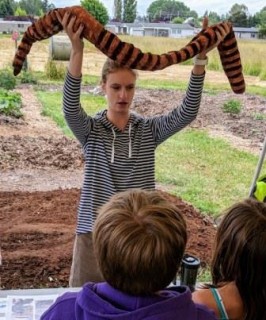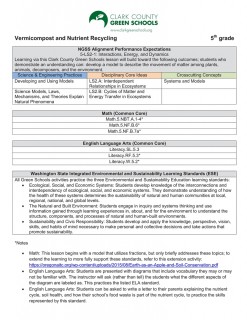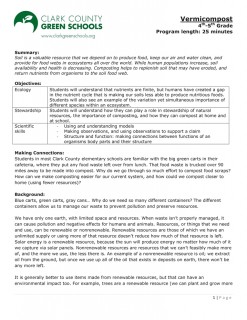Clark County Green News
Farm to Fork: a preview of new standard-aligned lessons
In early June, Clark County Green Schools and the Master Composter/Recycler program partnered to present during the Farm to Fork field trip at the Heritage Farm. Farm to Fork is a program that allows students to go to the farm on a field trip and spend time at different stations, learning about various aspects of our food system, agriculture, and natural resources.
This provided a great opportunity for us to practice some of our updated, standards-aligned curriculum! We're working on taking all of our offered lessons and presentations and strengthening them by creating lesson plans with articulated learning goals and elements that support Next Generation Science Standards (NGSS), Common Core/Smarter Balanced Assessment standards, and Washington State's Environmental and Sustainability Integrated Learning Standards.
Aligning existing lessons to these standards doesn't always mean adding content or making drastic changes; usually, it means changing ways in which the content is presented to help students practice the skills these standards are aiming to help students acquire.
For example, our 20-minute Farm to Fork lesson about compost and vermicompost (compost made with red wriggler worms) included the following elements that helped students practice skills and recall content they've been learning:
-Using our hands as models of the earth to understand how the portion of the earth made up of soils that we can use to grow food is very, very small, making it very important to protect the soil that we have. "Developing and Using Models" is part of NGSS - it's a "Scientific and Engineering Practice" that students use throughout their K-12 education.
-We also use a model of a red worm to explore how invertebrates break our organic wastes down into nutrients that can be returned to the soil and used by plants to grow more food. This again practices "Developing and Using Models" as well as the "Crosscutting Concepts" of "Structure and Function".
-We discuss the nutrient cycle and why it's important to return nutrients to the soil via compost, instead of sending organic wastes to landfills, where they cannot return nutrients to the soil. This reinforces "Disciplinary Core Ideas for Life Sciences" including "Organization for Matter and Energy Flow in Organisms", "Interdependent Relationships in Ecosystems", and "Cycles of Matter and Energy Transfer in Ecosystems".
These aren't the only ways that this lesson can and does connect to learning standards that teachers are required to use and that students are tested on. Environmental education provides much "low-hanging-fruit" - ample opportunities to use lessons that are engaging and memorable to help students reinforce, practice, and build upon skills and concepts that will make them better able to use critical thinking skills, problem solving, and creativity throughout their lives.
We want to help teachers take advantage of these opportunities afforded by environmental education, and by the amazing lessons, activities, and presentations offered by organizations throughout the community, including Clark County Green Schools. To that end, we are teaching a session at the ESD112 STEM-tastic Summer Science Symposium! Educators can earn STEM credit hours while learning how to incorporate environmental and sustainability education into what they're already doing, and how doing so can enhance student learning in multiple subject areas. The session will include an introduction to local resources, practice and tools for finding interesting lessons and aligning them to standards, examples of local teachers who have used environmental education and Green Schools programming successfully to enhance learning in various subjects, and more. Get the details and register at https://www.esd112.org/stemtastic. Sign up for the afternoon session, "Making Environmental Education Smarter, Not Harder." We are hosting that session each of the three days of the symposium; the information will be the same each day.
Can't make it to the symposium? Don't worry; Clark County Green Schools will be posting information about the alignment of the in-class presentations and lessons we provide, interviews with teachers doing this kind of work already, and resources on our website. You can also invite us to your classroom to teach a standards-aligned environmental education lesson to your students. Stay tuned; these web updates should be completed by mid-August!
When you subscribe to the blog, we will send you an e-mail when there are new updates on the site so you wouldn't miss them.






